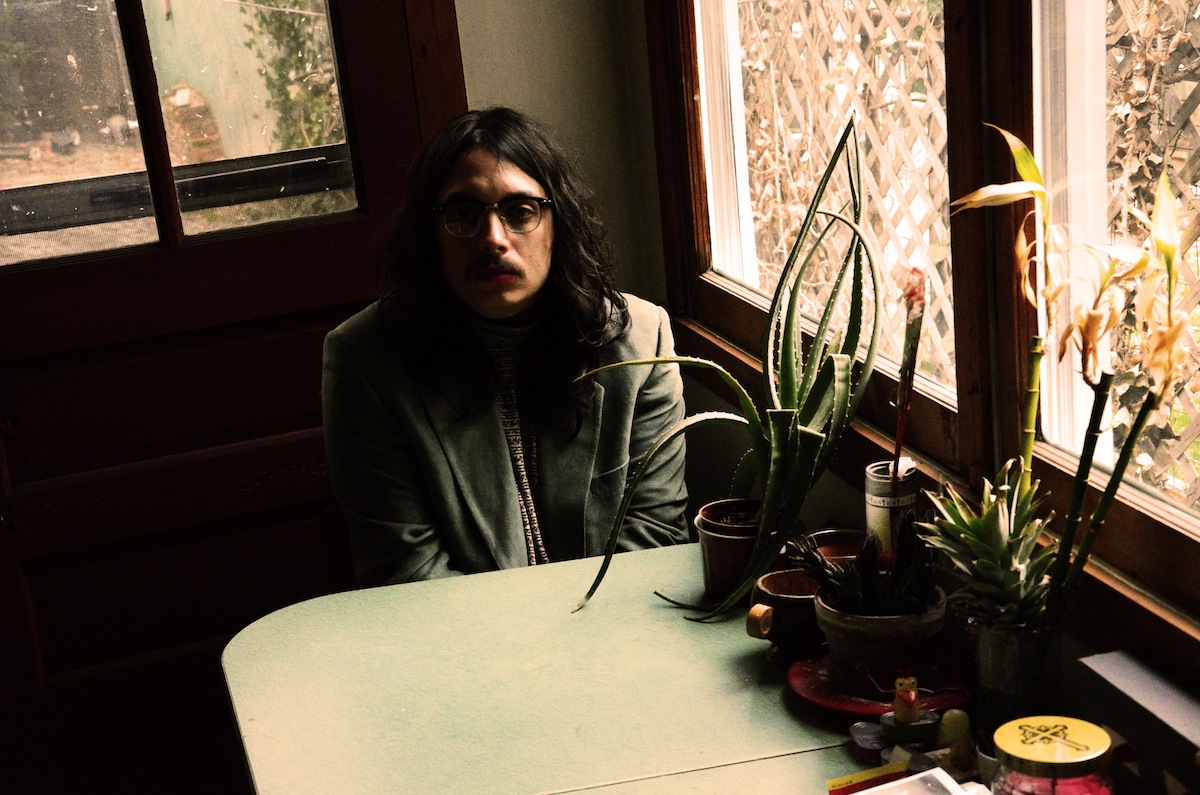Salvia Plath Has a Nice Trip

ABOVE: MICHAEL COLLINS, AKA SALVIA PLATH
Michael Collins has an affinity for drugs. That much is clear the first time you encounter the man’s music. Since 2009, under the name Run DMT, he’s made a bifurcated mix of textured drones and lo-fi beach pop—creating albums that were equal parts narcotized and euphoric, nocturnal and sun-baked. Album names like Bong Voyage, a song poem project called One Hitter Wonders, and his newest solo moniker, Salvia Plath, all contribute to the totality of his freight-train-hopping, joint-smoking persona. It’s echoed by the Technicolor psych-folk that marks his first LP under that new name, The Bardo Story.
Grubby acoustic guitar parts, close-knit high harmonies (so to speak), and the slow burble of a bong rip confirm that Collins’ fascinations lie firmly with dusty stacks of forgotten psych-pop records that line the basements of ex-hippies. Though he does indeed partake in the drugs in question, he shrugs off the suggestion that he does so more than anyone else. His adventures in altered states, as he sees them, are only the latest manifestation of his lifelong fascination with dreams and exploring his own subconscious. (For a taste, check out “Dreaming,” below.)
Over the phone from his hometown of Baltimore, Maryland, Collins speaks emphatically and effusively, laying out his complicated relationship with the drugs that he so often references and explaining the roots of his most carefully constructed record to date.
COLIN JOYCE: So you’ve changed the name of your musical project just a few years after you started it. Do you see what you’re doing under the Salvia Plath name as distinct from the music you were making as Run DMT?
MICHAEL COLLINS: When I started making music under the name Run DMT, you could tell that I had just started making music. I wasn’t really versed in music, and electronic music has birthed a lot of those kind of people and aesthetics. The first album that I did, Bong Voyage, came out of a time that I was traveling via freight train and hitchhiking. I was using a loop pedal that I had and wherever I went, whatever houses I ended up at, I sourced sounds from those places.
When I was younger, I didn’t really listen to a lot of music, in truth. I was more fond of writing short stories and interested in making movies and skateboarding. After I started making music, which I really got into on a whim, now people have shown me the rest of this music, and I really loved forgotten psychedelic pop and soul music. Those have been my two main loves, after experimental music, which was my initial introduction into music. I don’t think of it as a very big difference in the way I make the music, but the sounds represent a lot more of an acceptance of other music.
JOYCE: Is there any music in particular that you’ve discovered that’s made you more interested in those traditional structures?
COLLINS: Definitely, but one of the things that made me interested [in the idea of more traditional music] was the idea of collaboration. When I started making music, it was really open. I had no idea of the aesthetic or structure that I was looking for, and that was really great in terms of collaboration. Initially all the people I collaborated with were people that had never made music before. All around the world you’ll see a lot of music appreciators that think, “I can’t make music.” A lot of that early Run DMT music was me sitting down those people, and they’re musicians today.
JOYCE: How has that changed for The Bardo Story?
COLLINS: I’m learning instruments now. I wouldn’t say I’m very good at playing any particular instrument, but in the same way that I wanted to show everyone that they could play music without playing an instrument, I wanted to prove to myself that I could make music playing any instrument. Besides hearing music in the vein of rock-‘n’-roll and soul on my own, now I wanted to collaborate with people that grew up playing music. I wanted bridge the world between people who don’t know anything about music and people who think they’re too musical, that they know too much. They have things to learn from each other, and I have things to learn from all of them. That’s the full circle attitude that I’m trying to dive into each time I make music.
JOYCE: What sparked the decision to work with Domino Records and Weird World after self-releasing Dreams?
COLLINS: The reason why [Domino] took notice of what I was doing actually wasn’t because of [Dreams] but because of this album that I made called One Hitter Wonders. It was a tribute to the late ’60s tradition of “send us your poems and money and we’ll make you a 7″ for a couple hundred dollars.” When we did it, it was for $15, and we sent a cassingle. That project was and continues to be the one of the most meaningful endeavors I’ve ever taken on. We forged a lot of these intense relationships with these people that wrote these songs. There’s a songwriter, there’s a musician, there’s a poet in all of us, and that’s my firm belief. In the ’60s, this kind of project was all about musicians trying to make a living, but for us, it was cheap. I kept in touch with a lot of those people and they’ve continued to be creative since then. There’s a level of craftsmanship to that music, because we wanted people to feel like they’d made something good. I think Domino got wind of that. They’re a pop-music label, and I guess it’s something that not a lot of people were ambitious enough to do. On that basis, I think, they listened to the rest of that music.
JOYCE: This new record seems to fit in more with what Domino does; it’s a bit tidier or tighter. Was that part of the intent?
COLLINS: I also wanted to make a record my parents would like. My parents are pretty cool people, they live in Massachusetts, they’re post-hippie lovers. They introduced me to folk music when I was younger. I listened to it, but I never took to it. At a certain point when I was older this psychedelic folk thing clicked with me. I became interested in psychedelics and the psychedelic lifestyle, so I think I wanted to thank them. They actually did like the record. If you ask them about my first music and even up to Dreams, I don’t think they’d tell you honestly that they like it. So I was glad to make music that I thought my friends could like and that they could listen to with their folks. In a way we wanted to make it sound like a record in the trend, not of ’60s music or not of a specific kind of pop music, but of people who make music in their homes and have these dreams of how it can sound. A studio, if it’s working correctly, should just be people with bigger dreams than their soundboards.
JOYCE: Does that fascination with psychedelia extend into your personal life?
COLLINS: In general, I think there’s a lot of misconceptions when people are interested in psychedelia. I’m definitely trying to make light of the fact that once people know that someone does drugs they think they can pinpoint them. By making those names and those jokes I’m trying to say, “How silly is it to think that any one thing that someone does can define them?”
I’m not someone who does that many psychedelics, but I am somebody that does do them and with an extreme interest in mind expansion. I’m definitely receptive to psychedelic experience with or without the use of substances, but I think people have a stigma around psychedelics that’s just so negative. I’ve been lucky enough to know some older people who have done a lot of good work, therapeutic and otherwise, through the use of psychedelics. One of the songs on the albums is called “House of Leaves” and is based on a book that is, in my mind, one of the pinnacles of psychedelia. It goes into the idea that there’s an intellectual psychedelia—one without drugs—that is the deepest form of psychedelia.
JOYCE: Since you have those ties to the more serious side of the experiences, it makes sense that it bleeds over into your music.
COLLINS: I think the best way for me to explain this, and to explain why I chose the name Salvia Plath, is I could just tell you [about my experiences with salvia]. I’ve only done salvia twice, but it’s one of the [psychedelics] I’m most interested in. It’s ironic because most of the people that I know that have done salvia have really bad experiences or come into it in a way that pushed them in the wrong direction.
The first time I did it I was sitting down by a lake and I smoked it and I immediately felt myself be pushed back. I initially tried to keep myself up (not wanting to be pushed backwards), but I realized that wasn’t the point of going into an experience. So I just laid down with it. Because I went with it in the first few seconds and because I understood that I was pushing myself into a new realm of consciousness, I ended up falling backwards and I opened my eyes into a world that was completely white. It was, in my mind, one of the most important places I’ve ever gone in my life. It was a full blank slate. The only thing that was there was the most beautiful sound in the world. I looked at my body and it was a capital letter R. I looked to my left and my right and infinitely to all sides of me were people everywhere, and everyone’s body was a letter. Essentially, I was transported onto this page.
Later, thinking about it and breaking it down, I see that as being in conversation with the idea that life is like a book. I remember hearing this voice I couldn’t understand, but I understood even in the experience, that it was a higher force reading the story of everyone. I thought that was really beautiful. That experience definitely comes through the album at points.
JOYCE: It sounds pretty powerful.
COLLINS: I’ve tried to share that with people, the interest that it gave me looking at life with a little bit less attention to detail. One of the things about people that are interested in psychedelia is that they’re generally people that are interested in philosophy or nature. They look at life with a little bit more of a kind eye and less of a discerning mindset of whether they’re at the right place in their life or doing the right things or meeting the right people. People who are interested in psychedelia are a little more easy on things. Life is just this big stream and you can only get in. You just want to be able to float down it.
SALVIA PLATH’S THE BARDO STORY IS OUT TOMORROW. FOR MORE ON THE ARTIST, PLEASE VISIT HIS WEBSITE.






